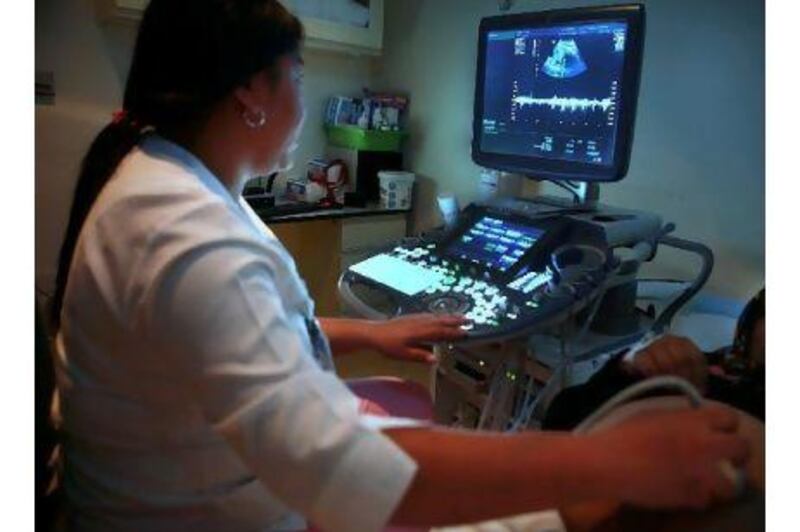ABU DHABI // Corniche hospital will launch a preconception care programme aimed at newlyweds this year to ensure their new families get the healthiest possible start in life.
The programme is a response to high levels of gestational diabetes and a general lack of awareness about simple health measures for women planning a pregnancy that can help ensure a healthy child.
"We want to start a preconception care programme to make sure that every woman who is thinking about pregnancy, every woman who gets married in Abu Dhabi or registers her marriage, will receive enough material to educate her on what she needs to do in order to prepare her body," said Amira Walli, the director of public health at Corniche hospital.
As part of their marriage programme, women will receive a package of leaflets and brochures stressing the importance of a balanced diet and daily exercise in order to be at an optimum weight before pregnancy.
Each woman would receive a voucher to attend an educational class at the hospital's women's health centre, said Ms Walli, who instituted the programme of car seats for newborns last year.
The hospital is also considering setting up a pre-pregnancy clinical counselling system to address women's health issues before they start pregnancy planning.
"We want every woman to start taking her prenatal vitamins at marriage, and two to four months before she conceives, so that in case a pregnancy occurs, the body already has all the micronutrients it needs."
The most important of these, Ms Walli said, was folic acid. "We need to focus on folic acid in order to dramatically reduce the chance of spina bifida and all the other neural defects associated with a lack of this essential vitamin."
Folic acid is needed in the first 20 to 28 days of pregnancy; most women do not learn they are pregnant until six weeks into the pregnancy, which is considered too late for the vitamin's benefits to occur.
The prevalence of spina bifida in the UAE is similar to international rates, with one out of every 1,000 babies born suffering from the disease, said Dr Gowri Ramanathan, a consultant obstetrician and gynaecologist, and fetal medicine specialist at the hospital.
"Research on the UAE population has revealed that folic acid deficiency is a serious problem and a lack of awareness is the cause."
Some other countries, such as the UK and the US, fortify some food products and cereals with folic acid.
"That should be addressed in the UAE, taking into account the cultural relation to food," Dr Ramanathan said.
Each woman who plans on getting pregnant should be consuming 0.4mg of folic acid daily for at least two months prior to conception. Women with a higher risk - those who have had babies with spina bifida or who take certain medications - should be taking 5mg, she said.
"It makes such a huge difference and it is something that is so simple," Ms Walli said.
With other complications in pregnancy such as gestational diabetes, prevention was much harder and required lifestyle changes that were difficult to implement because they were often a matter of habit, she said.
To prevent spina bifida, however, takes just one pill a day for a few months, and the result is peace of mind during the pregnancy.
Dr Bashir Salih, the hospital's chief of service and gestational diabetes specialist, said that all women of childbearing age should be taking care of themselves - screening for diabetes, taking folic acid supplements and making sure they did not have a vitamin D deficiency, which is common in this part of the world.
"Women do not realise that there are so many things they can do to prepare themselves for pregnancy, and just assume that once they are pregnant, that is when they have to start taking care of themselves and eating specific foods and taking vitamins," he said.
Ms Walli said she hoped that the programme would be as successful as the infant care safety campaign, which resulted in a Newborn Safety Centre being established on hospital grounds.
"We want to take a step back now and talk to women before they become parents. By improving their health, we can potentially improve the health of the entire community," she said.
The imporantce of folic acid
A lack of folic acid can lead to congenital malformations that occur in the first 20 to 28 days of pregnancy, and involve incomplete formation of the brain and spinal cord in developing embryos.
Because only 50 per cent of pregnancies are planned, and women do not find out they are pregnant, on average, until six weeks into their pregnancy, women of childbearing age should make sure they are getting enough folic acid before any chance of a pregnancy occurring, said Dr Gowri Ramanathan, a consultant and fetal medicine specialist at the Corniche Hospital.
Studies have shown that women who take 0.4mg of folic acid daily prior to conception and during early days of pregnancy can prevent these neural tube defects by 70 per cent.
* Hala Khalaf





